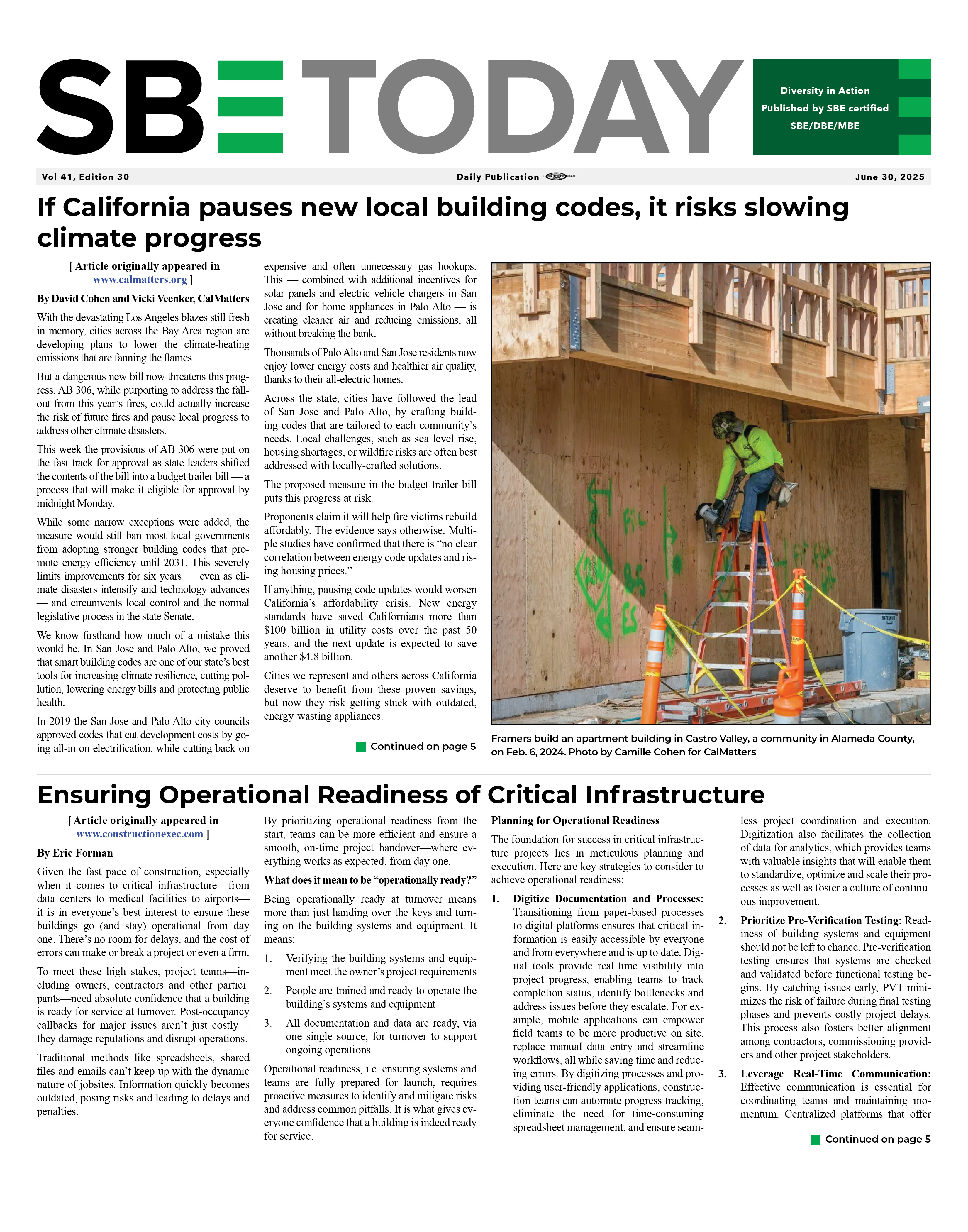Why Cash (Flow) Is King in Construction
08/19/2020
[ Article was originally posted on www.constructconnect.com ] In spite of the current uncertainties caused by the COVID-19 pandemic and state lockdowns, many contractors have managed to keep their companies—and their bank books—strong throughout this turbulent period because they understood the importance of managing cash flow. Focus on Cash Flow Year-RoundFar too many contractors focus on cash flow only at the end of the fiscal year and then only for financial reporting purposes. To create a truly viable business, though, cash flow must be a primary consideration 365 days a year. For contractors, cash flow typically comes from four sources: profitable jobs; equity contributions from the owner, usually made in difficult times to meet immediate cash demands and provide equity by increasing the company’s overall bond rating; loans from the owner, which inject cash into the company but with a neutral impact from a bonding perspective; and outside financing, the least favorable option, usually involving a line of credit, equipment financing, or lease vs. buy decisions on equipment. Budgeting for ProfitCash flow management for contractors starts with proper budgeting of the company’s overhead, general and administrative expenses, for the year ahead. Doing so allows a contractor to calculate what is needed in order to break even and how to structure bids in order to provide for a sufficient profit margin. Beyond that, contractors should view each job as its own individual profit center. To that end, the contractor should review cash projections in the early stages of each job, taking into account: current workload and whether the company’s workforce is already fully utilized (if so, costs for additional labor must be considered); the financial stability of the customer and past payment practices; the location of the work (including variable wage rates in effect in some locations and the role weather may play in completing the job on time); and any penalty or incentive provision, billing specifications, or payment terms that are included in the contract. Conduct A Cash Flow AnalysisOnce those questions are answered, the contractor should analyze the inflows (cash receipts including billings, retentions, and claims/change orders) and outflows (cash disbursements including bid costs, preconstruction costs, labor, materials, subcontractors, and overhead) of the contract. Analyzing receipts against disbursements will provide the net cash flow for the project. While cash flow analysis will not necessarily prevent cash flow problems, it will arm a contractor with a better sense of the relative worth of each project and, when combined with other projects underway, provide better information about the direction of the company as a whole. While a cash flow analysis will not prevent bad times from occurring, it will help to inform the contractor if tight times are ahead. As a result, the contractor can be better prepared to deal with cash shortfalls. Avoiding Cash ShortfallsThe best way of dealing with cash shortfalls, of course, is to prevent them from happening in the first place. That’s not always possible but improving cash management starts with billings. While each job will be somewhat different, contractors should do their best to seek favorable contract terms that allow them to accelerate cash flow. Ideally, the contractor’s billing terms will provide for a billing schedule that corresponds to the time schedule established in the job specifications. Many contractors front load contracts, charging higher markups in the early stages of a job and then taking a lower markup or even a negative profit margin at the end of the project. While this technique allows the contractor to earn the entire gross profit on a job upfront, it can be a dangerous practice if the contractor falls into the trap of taking funds from one job to cover cash flow losses on another job. Similarly, an upfront influx of cash may lull some contractors into a false sense of financial security which leads them to spend unnecessarily without recognizing future cash outflow needs. Be Proactive About Billings & CollectionSubmitting billings according to the terms spelled out in the contract is also essential. Smart contractors will structure a contract in a way that allows them to bill as soon as one or more segments of a job have been completed, rather than waiting for the entire project to be finished. Similarly, contracts which permit billings for cost-plus jobs may allow contractors to estimate costs during a period and then make cost adjustments as necessary near the end of the project. Billings mean nothing, of course, if collections are unsuccessful. If such instances occur, communication with the customer, project manager, and contractor’s management team is of paramount importance. Ultimately though, if such matters cannot be resolved quickly, the contractor should have established procedures for filing liens when appropriate and should not hesitate to use them. Contractors can also manage cash flow by carefully monitoring underbillings and overbillings. Overbillings are good only if that money is already in the bank or in receivables waiting to be collected. Underbillings, on the other hand, indicate poor cash management because the contractor is essentially financing the project. Final Thoughts on Managing Cash FlowFinally, cash management can be impacted by the way in which the contractor manages the punch list at the conclusion of the project. Not addressing the punch list allows the retainage of the job to diminish or the timeliness of collections to extend, both of which cost the contractor.
The bottom line here is simple: good cash flow management is essential and can make even the most successful company even more profitable. Back To News |
|
|
|
ABOUT SBE Inc.
Small Business Exchange Inc., is the ultimate business information hub for small businesses, disadvantaged, Asian, Black, Hispanic Women and Disabled Western-owned Business. Founded in 1984 by Gerald W. Johnson and Valerie, Voorhies, SBE, has been working for over two decades to provide businesses with the most powerful tools available and accurate, up-to-date information about contract opportunities in the public and private marketplaces. CONTACT
Small Business Exchange, Inc.
Phone: 415-778-6250
© 2025 Small Business Exchange, Inc.
|
||
|
|
Why Cash (Flow) Is King in Construction
08/19/2020
Back To News |
|





